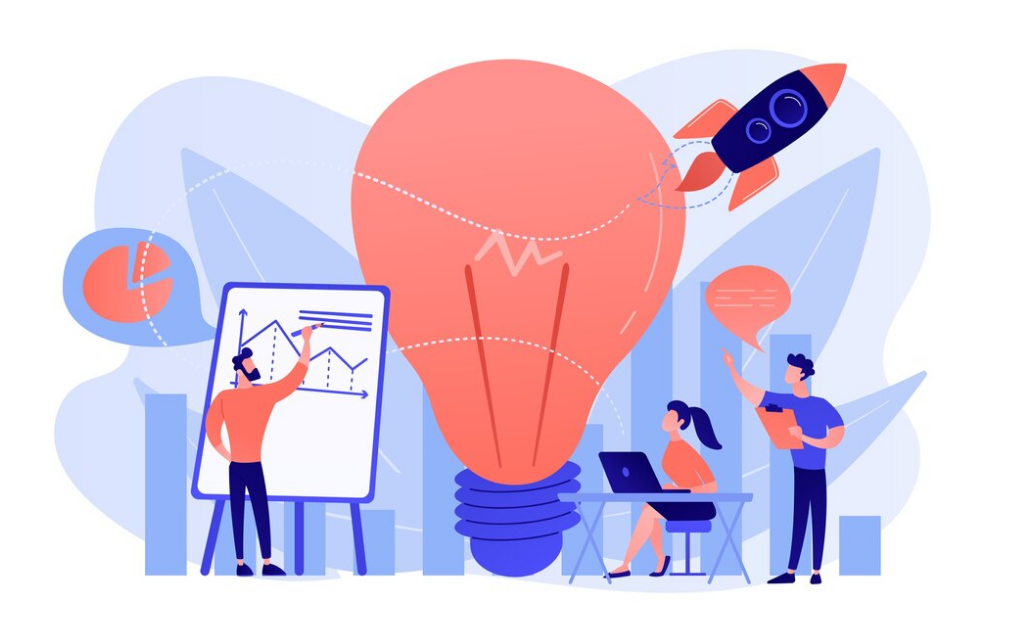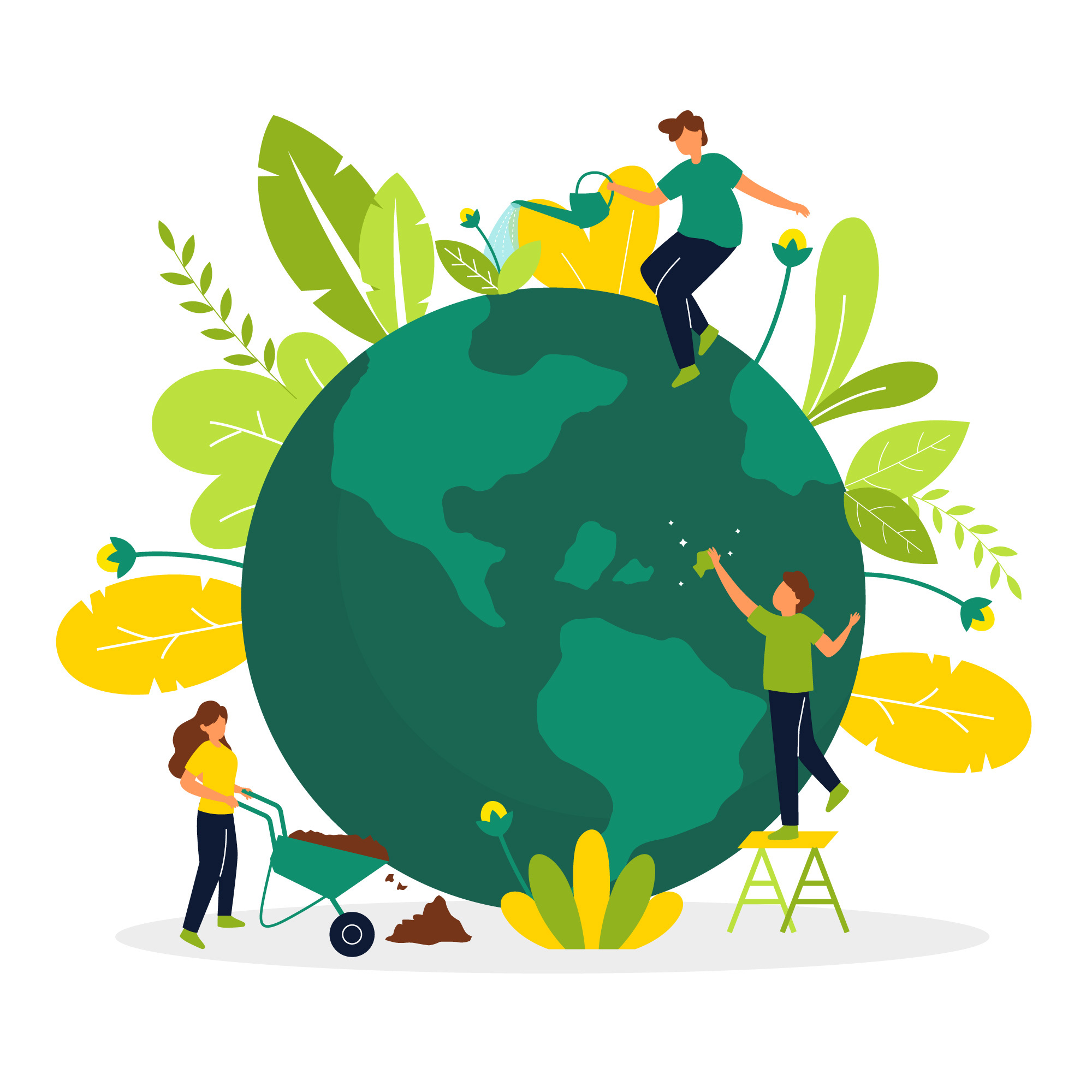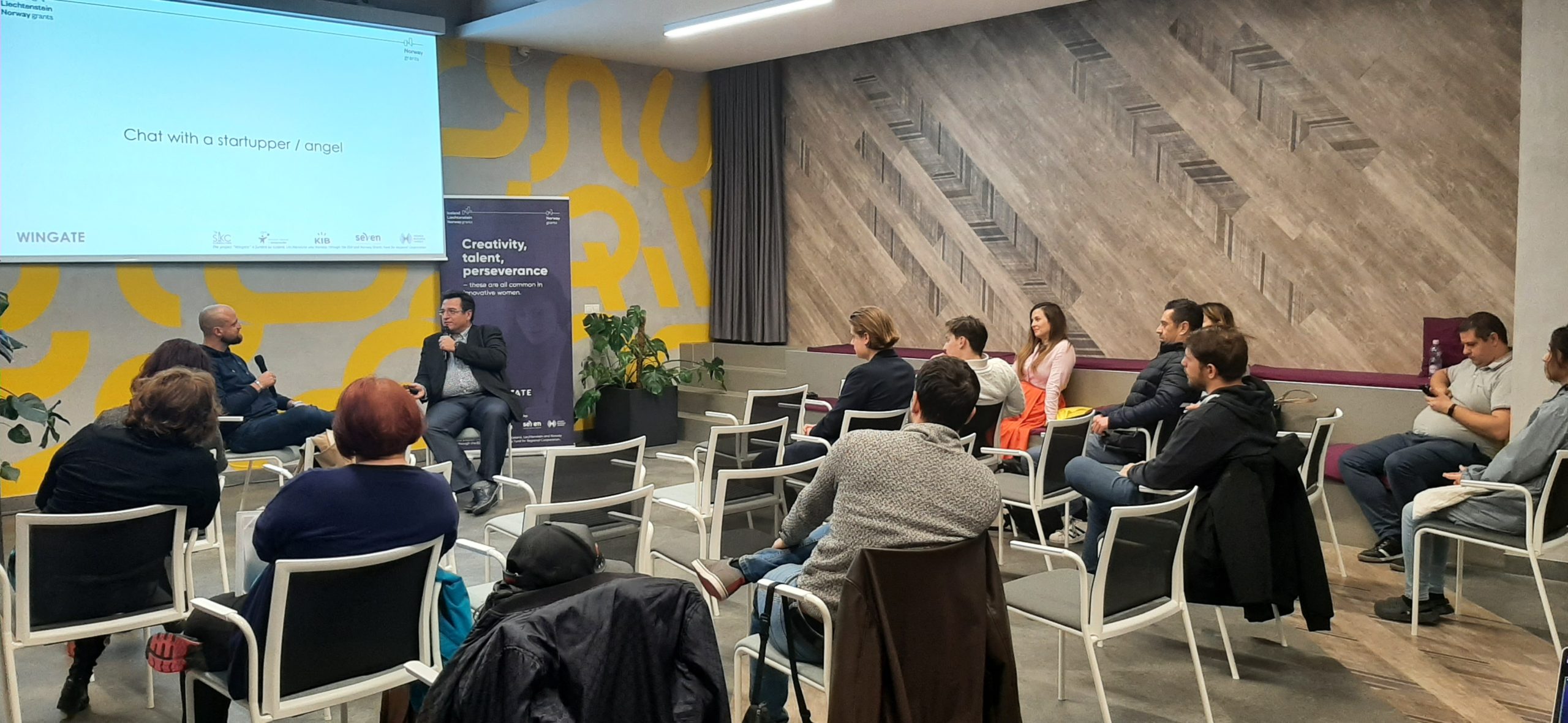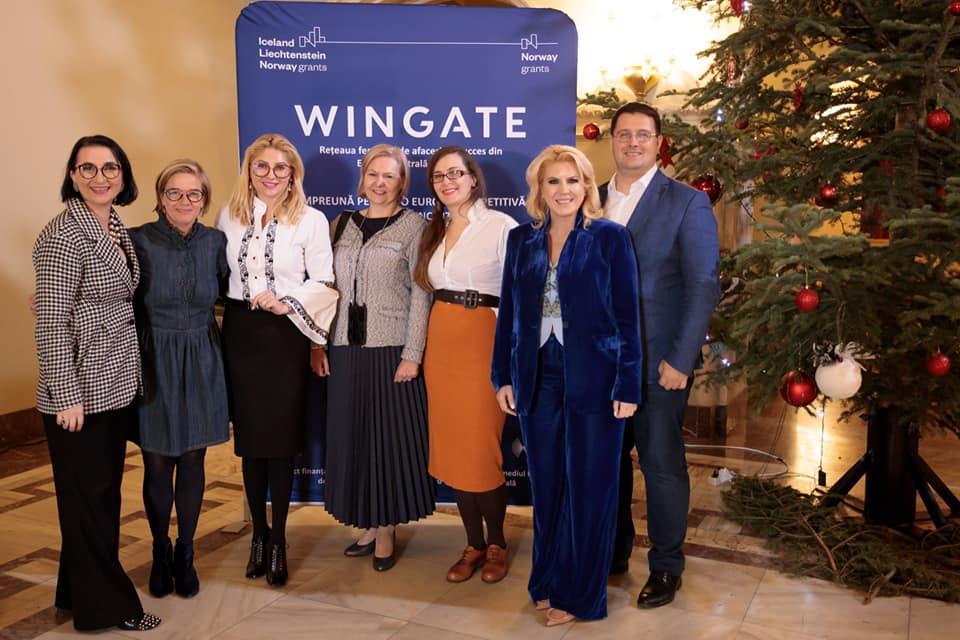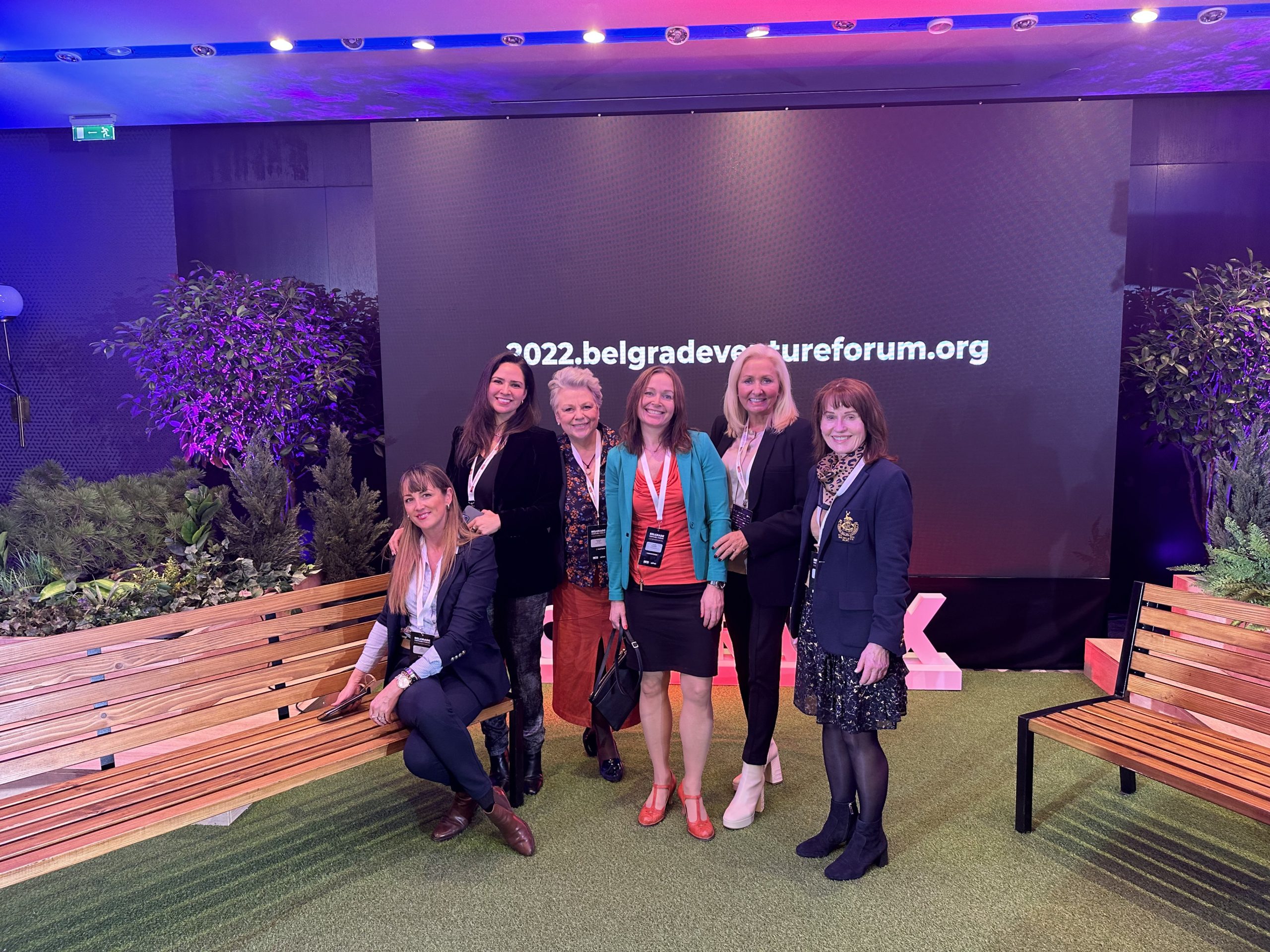Article from my perspective: Wingate project, oh, what a ride it has been!
Article by Andela Urosevic, Serbia
I can't help but feel overjoyed about the recent surge in registrations on our e-platform, especially from Serbia. Seeing over 400 new sign-ups and a whopping 200,000 visits from our own country, with 70,000 folks diving into educational courses, is just mind-blowing. It's like watching our hard work come to life right before our eyes!
But you know what's even more incredible? It's seeing how women in Serbia are stepping up with this newfound courage to chase their entrepreneurial dreams. I swear, there's this amazing shift happening, and it's all thanks to the work we've been doing.
I remember how it all started... from crafting that very first questionnaire to spreading the word through every possible channel, it feels like we've been on this wild journey together. Those meet-ups, conferences, and educational sessions have been the heartbeat of our community nurturing budding women entrepreneurs every step of the way.
Let's not forget the Belgrade Venture Forum events, both on- and offline. Those were something else, especially since we were in this together with all the partners from the team. It's been a real inspiration working with all of you during these days.
But it's not just about the big events. It's the little victories too, like the Female Leadership Summit and our awesome collaborations with organizations like NALED. Each win, each success story – they're all pieces of this beautiful puzzle we've been building together.
As I recall this whole journey now, collecting these thoughts, I can't help but feel a sense of pride wash over me. Our passion-fueled teamwork has paid off big time. And while this chapter of the Wingate project might be winding down, I've got this gut feeling that it's just the beginning of something even more incredible.
So, here's to us – to all the meetings, the brainstorming sessions, and the victories, big and small. We've not only created projects but also sparked a wave of empowerment and change. And you know what? I can't wait to see what we'll conquer next. Cheers to the future – it's bound to be one heck of a ride!
The role of Business Angel Investors in restart and resilience of post-Covid business life and economy
1. The first lesson – organizational level
When the WINGATE project was awarded by the EEA and Norway Grants Fund for Regional Cooperation
mid-April 2020, Europe was just about a month into the chaos, sudden despair, tragic human and
personal loss, paralysed regions and countries caused by the outbreak of the COVID-19 pandemic. News
were all about lockdowns, PPE and hazmat suits, horrifying hospital situations and desperate small
businesses questioning their future fates in almost all industries.
At those times it seemed impossible to realise a successful project that builds on human relations,
trainings, mentoring, networking and international collaboration. We were all trying to manage daily life
when not only the tech-savvy but each every one of us had to suddenly learn to operate parallel online
video calls, web-based collaboration platforms, while we also ordered groceries and food online – so the
delivery service rings the bell just in time when the kids have a lunchbreak in their homeschooling
agenda.
The challenges were great and there were tragic losses. But as step by step, week by week, month by
month we learnt to live together with the pandemic, we also had the chance to learn something
wonderful: that based on 21 st century technology, we can be closer than ever before. Project meetings
online can take place every week, speeding up our work, compared to the pre-pandemic once-in-a-
couple-of-months personal trips that tired all participants and were unfavourable for the environment
as well. Certain trainings, discussions, conferences can be held online, which does not only open up the
opportunity to tackle the lockdowns but also allows us to invite speakers from all around the globe, and
participants joining our discussions from so many various countries.
Women/Business/Angels Association spent the first half of the WINGATE project trying to learn that
lesson and better it as much as possible. As most of our discussions and content already had English as a
working language, we organised a hybrid international forum in October 2020, an online training test
series in the first half of 2021 and two further hybrid international fora in June and November 2021. We
invited speakers from Norway, Poland, France and several other countries, and we were able to present
the project, present ourselves and the Hungarian innovation ecosystem for so many domestic and
foreign participants at our events.
As time passed and restrictions loosened, we got used to it, we organised hybrid events while we were
working out and testing the training materials designed for the WINGATE project. We knew our project
partners much better by voice than by face (as often due to narrowband internet connections we turned
off cameras during our videocalls) and worked together towards our common goal, but from different
corners of Europe.
2022 has brought a change to our work. As the pandemic seemed to be tamed by the brilliant inventions
of COVID-19 jabs (with enormous efforts included from female scientists and experts) travel, especially
international travel became more manageable and we had a set of lovely consortium meetings, where –
as it turned out – it was also invigorating to meet in person, have small chats, a coffee, a dinner together and allow ideas to spread and grow apart and beyond the core project targets. We made and renewed the human connections and strengthened the collaboration among the partnership. We also reached out to actors, entrepreneurs, business angel investors and policy stakeholders on the personal level aswell, making good use of the opportunities to bring people together, building bridges and networks that can be built into the project and – next to the actual and factual Knowledge Base presented on the online portal – can also result in tacit knowledge and networking capital for the participants. We strongly hope that the WINGATE project has profited from this experience as much as we, Women/Business/Angels have done, and the benefits are transferred to our target groups, our networks of women entrepreneurs and business angel investors in our national and (Central) European innovation ecosystems.
2. The second lesson – business level
The WINGATE project’s consortium is composed of several different partners, each bringing in their own
knowledge, network, stakeholder groups to the common table. Women/Business/Angel has been
responsible for the training series development related to women business angel investors and
preparing as well as testing those trainings, spreading the news, inviting more and more actors and
stakeholders has been our main target throughout project realisation.
One key part of the lessons we learnt was that business angel investors are almost fictional characters in
the eyes of a common entrepreneur. The concept is not well defined and understood, while they are
rare, seldomly seen, more of an urban legend than reality. We aimed to find the reasons and mitigate
the situation by starting our training sessions and contents with explaining the basics and inviting real-
life investors as special guests to our events to help the audience become better acquainted with the
concept and the people as well.
First, in scientific literature there is a significant difference between small business owners and
startuppers – the first are people who set up a legitimate business that caters local demand and
provides breadwinning opportunity to the entrepreneur as well as his/her employees. The second group
are startuppers, who – from day 1 – aim to build a born-global business, well-profitable on the long run
for the founders, scalable - and therefore in most cases IT based. Both types of enterprises are useful
and have their place in the economic landscape, but only the second group is tantalizing enough for
business angel investors (and maybe later on, for venture capitalists) to invest in.
The COVID-19 pandemic had changed the rules of the game for both groups and may also have blurred
the strict line between the two. For small business owners, many were operating in endangered sectors
(tourism, hospitability, etc) and were forced into a situation where they needed to innovate beyond
their comfort zone in order to survive. Many previous employees have lost their jobs and have found
themselves in the shoes of an entrepreneur-to-be. Everyone had picked up very fast the new IT skills
that were needed to work from home, even from remote locations. Physical location was suddenly
much less important, relevant IT technologies were available and used in a much wider circle, therefore
both the global market and scalability became within reach for many who were previously just planning
to open up a small business. This blurring of the line between small businesses and startups have further
been enhanced by the growing up of the born-digital post-millennial generations.
As economic perspectives darkened with the pandemic, investors run ahead – and looked for every idea
that may be interesting to be picked up, financed, supported and they were encouraged by the
significant amount of recovery funds allocated by the various national governments as well as by the EU
for revitalising economy.
This unique composition of new actors in the innovation ecosystem has made the WINGATE project
even more important than as planned years before at the time of proposal formulation. The first steps
to be taken as an entrepreneur, the mature guidance to entrepreneurs planning to grow and the
introduction of business angel investors into the picture was just at the right place at the right time in
order to add its inputs supporting these businesses not only to survive but to be reformed, re-thought,
adapted to new, post-Covid business practices and become more resilient.
Our network of entrepreneurs and potential business angels have confirmed that our discussions,
trainings and networking have helped them take the necessary steps forward, and we hope the project
contributed to the rebuilding of businesses and supporting female entrepreneurs/investors in our
regions.
3. The third lesson – economy-level
Women's empowerment and gender equality are critical to economic development. The United Nations
confirmed that women’s economic equality is good for business as it fuels economies, benefiting
everyone 1 . Women entrepreneurs can make substantial contributions to innovation, job creation, and
economic growth.
A Boston Consulting Group study found that businesses founded by women delivered higher
revenue—more than twice as much per dollar invested—than those founded by men, making women-
owned companies better investments for financial backers 2 . Nevertheless, female entrepreneurs still
face considerable challenges, including lower access to finance. According to a report by the European
Institute for Gender Equality, in 2018, women-led businesses represented only around 30% of all
entrepreneurs in the European Union 3 .
Angel investors play a crucial role in the entrepreneurial ecosystem by providing much-needed early-
stage capital. However, the gender disparity in this field is striking. A 2020 report by the British Business
Bank indicated that for every £1 of venture capital investment in the UK, all-female founder teams
received less than 1 pence 4 . Given that women-led startups perform as well, if not better, than those led
by men, increasing the number of women angel investors would not only advance gender equality but
also drive better returns and foster innovation.
The COVID-19 crisis has disproportionately affected women, yet it also offers an opportunity for a
gender-responsive recovery. A research conducted in the iFEMpower project has found that 63% of
female entrepreneurs spent less time on their business during the quarantine period, on average they
spent almost 2 hours less on their business on a usual weekday and spent 2 hours more on caring
responsibilities. 5 Yet, the European Institute for Gender Equality highlighted that investing in the care
economy, digitalization, and green economy, where women are prominently engaged, can be key for
Europe's economic revival post-COVID-19.
In order to support the strengthening of existing women-led businesses, to increase their adaptability
and resilience, more targeted efforts are needed to support women entrepreneurs, such as dedicated
funding, mentorship programs, and gender-inclusive policies, could help tap into the full potential of
women's entrepreneurship in Central Europe and across the continent.
In conclusion, increasing the role of women in the economy and society can yield substantial economic,
societal, and environmental benefits. Women's entrepreneurship and involvement in angel investing
should be encouraged and supported, particularly in the post-COVID recovery period and in regions like
Central Europe where the potential for growth is significant. Economic growth must be fueled by all the
power our engine has, and that includes a fair share of women’s capacities and potential as well.
4. Post scriptum
...And towards the end of the third year of WINGATE, when we realised that the project is almost over,
we wished if it could continute, to be able to reap the benefits of the efforts, to see all ends to meet,
entrepreneurs and angels collaborating towards a greater good. And our wishes became true, one more
semester was added to our joint activities. Our final event on 8 November 2023, represented what we
stand for: women entrepreneurs, business angels and impact managers collaborated in discussing how
to create more impact-generating, social innovation based enterprises that benefits us all.
Reflecting on WINGATE’s Legacy – thoughts of the Leading Partner
As the lead partner of the WINGATE project, we at SKC-Consulting Ltd. are filled with a mix of pride
and nostalgia as we approach the conclusion of a journey that has reshaped the landscape for women
entrepreneurs in innovation. Supported by a substantial grant from the EEA and Norwegian Grants
Fund for Regional Cooperation, we embarked on a mission in 2020 that would take us through the
challenges and triumphs of empowering women-led enterprises across Hungary, Moldova, Norway,
Serbia, and Romania.
Our collective goal was crystal clear: to ratchet up the number of successful women enterprises,
especially in the fast-evolving innovation sectors, and to level the playing field when it came to their
competitiveness and opportunities. The digital transformation of the global economy was not just a
backdrop but a springboard for our endeavor. We saw a unique chance for the Central-Eastern
European region to bridge the gap and introduce a new, invigorating approach to female
entrepreneurship and investment.
The cross-country collaboration at the heart of WINGATE has been nothing short of inspirational. Each
partner brought their A-game, sharing knowledge and best practices to forge a methodology that has
ignited a new wave of female entrepreneurs and shrewd angel investors. It's been an exhilarating ride,
offering both online and offline training, fostering community spirit, and delivering digital solutions that
have truly revolutionized the go-to-market strategy for our beneficiaries.
During the project's lifespan, we hit the ground running with 60 training sessions that spanned across
our five partner countries. These events were tailored to spark innovation and fuel the entrepreneurial
fire within our participants, whether they were joining us in person or logging in from afar. Each session
was a stepping stone towards building a more inclusive, financially accessible, and competitive
environment for women-led businesses.
As we reflect on WINGATE's impact, it's remarkable to see the transformation in the innovation sector.
Women's engagement in cutting-edge industries has soared, and their businesses have climbed the
competitive ladder. Beyond the numbers and the success stories, it's the shift in mindset that stands as
the true hallmark of our project. Decision-makers are now more attuned to the needs of women
entrepreneurs, and stakeholders are actively participating in the development of women-led
enterprises.
The sustainability of our efforts is encapsulated in the WINGATE digital platform—a regional knowledge
E-Platfrom's redefined how local, often isolated companies engage towards internationalization.
This platform is designed to endure, attracting new users and investors long after the project's
conclusion.
Though the WINGATE project in its current form has reached its end, the journey is far from over. We,
the partners, are unanimous in our decision to continue the momentum we've built. The e-platform,
which stands as a testament to our collaborative efforts, will see ongoing development and
enhancement. We remain on the lookout for fresh opportunities to expand our reach, improve our
services, and create new pathways for success for women entrepreneurs. The spirit of WINGATE will
live on, as we carry the torch of innovation, empowerment, and community into the future. Together, we
move forward with the shared conviction that our work is vital and must continue to evolve, just like the
dynamic and ever-changing world of entrepreneurship we serve.
Here's to the future — a future where the accomplishments of WINGATE are just the starting point for a
world of opportunities for women entrepreneurs and innovators everywhere.
Wingate leaves behind a united community, focused on continuous education as a pillar for the sustainable development of Romania and Moldova.
To assume risks and act swiftly, but to surround oneself with the right partners and employees, in whom to trust and respect. It will be an exercise rewarded through reciprocity. Invest time and energy in building relationships with professionals in the field, attend conferences, and join professional organizations. Engage in constant networking, seek sources of investment for the businesses they lead, but above all, think big, beyond boundaries of time, country, and mentalities! Discover and contribute to building a community as the sole solution for a better society! This is what 2500 businesswomen have learned over a project spanning 3 years, and its echoes will reach several thousand more members of families, employees, friends, and partners.
As part of the Wingate project, hosted by ANAA, more than 40 events were organized in Romania and Moldova, covering a geographically diverse area, both in terms of local entrepreneurial profile and economic development. Large cities with entrepreneurial tradition, strong communities, as well as those in the early stages, gravitated around positive, universal values.
Romania, a Latin country with a profound respect for the input that women have in education, has a distinct characteristic: companies with 100% female ownership have an average profit rate almost double that of those with 100% male ownership. In the entrepreneurial environment of Romania, women hold shares in 47% of active companies with a turnover exceeding 10,000 lei, almost at parity with men. Moreover, one in four companies is 100% owned by women. Although they represent almost half of the active companies in Romania, the total turnover of female-owned companies was 82 billion euros in 2021, accounting for only 21% of the total reported revenues. What Wingate implemented in the consciousness of participating women was the COURAGE to expand their field of interest, the scope of their activities, and the knowledge of specific tools for business scaling.
These events had two important components to offer the target group: valuable information through the training provided by invited trainers, contributing to the development and growth of businesses, and an excellent networking platform where businesswomen from various fields could interact directly to establish potential business collaborations. Session themes included Business Digitalization, Taxation, Communication in Business, the Importance of Networking in Business Growth, and GDPR Regulation in Business. But above all, what the Romanian entrepreneurial environment has learned is courage, inspiration, and the value of continuous education.
Wingate was perceived locally as a universal, significant project, synchronized with the needs of the current times, a business catalyst created to endure! Wingate demonstrated its strength to coagulate, to lay the foundations of a gender community, well anchored in business reality, with vision, elegance and a lot of motivation for success.
Through the WINGATE project, we promote women who want to become entrepreneurs, who want to to explore and develop their skills and abilities in order to help them reach their objectives wingateproject.com
Join the WINGATE community by accessing free trainings, do networking and learn from other success stories and get inspired https://wingateproject.com/e-platform/
Wingate's main objective is to increase the number of women-led enterprises and aims to support women entrepreneurs to achieve equal opportunities and competitiveness in entrepreneurship, especially in innovative fields. The project creates the framework of an international partnership in the Central and Eastern European region between Norway, Hungary, Romania, Republic of Moldova and Serbia, ANAA representing Romania and Moldova, as a vehicle for implementation, dissemination and growth.
The Wingate project is funded by Iceland, Liechtenstein and Norway through the EEA- Norway Grant Fund for Regional Cooperation.
WINGATE project – moving forward
The Wingate project was initiated as the pandemic started, which became an extra challenge, but also a kickstart for online trainings and knowledge sharing between countries and communication with the target audiences. Kvinner in Business has the role of expertise partner, supporting the partners Hungary, Moldova, Romania and Serbia in the project, offering different services including speakers for events.
The main task is to support women to be successful in business and to make their wishes come true. It’s not just about supporting the women who already has started their own business. It also offers training to women who are currently employed, unemployed. thinking about how to start a business, how to be successful or how to grow existing business. However, the goal is to contribute to support innovative business, product and service establishment, or creating a new business model. In addition, the Wingate project is unique in offering training for those, who consider to invest in startups and women’s businesses as business angels. This will also contribute to a serious boost for the regions’ economic growth. If women acquire the skills needed to become an investor and become competitive in this area as well, a number of promising new businesses can be created this way that can achieve considerable success even when entering the international markets.
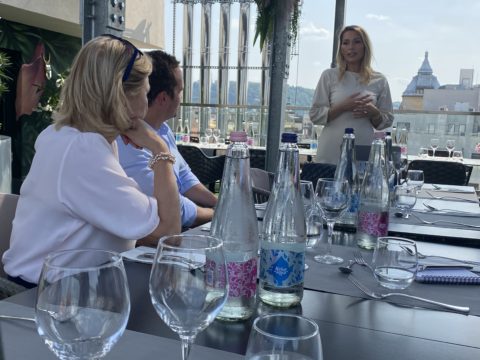
Donna Kastrati, representing KiB, shared her experiences regarding growing her business on the closing event in Budapest Hungary (before the project was formally extended).
The project has now been running for three years and here are some of the accomplishments:
- A survey counting more than 1400 respondents. Key results:
- Women want to develop both social/soft skills and specific professional knowledge.
- Financial and management expertise were the most important factors, but “Thinking out of the box”, networking and possessing the right level of self-confidence and courage was considered important to obtain entrepreneurial success.
- Barriers to start a business were the regulatory environment, constantly changing market conditions and precursory uncertainty.
- 55 events with more than 1800 participants in four countries. Due to the pandemic and later the war Moldova has not hosted events.
- 110 digital trainings dived into three areas: 1) How to start Your Business, 2) How to Grow your Business and 3) Business Angels. The training material consists of videos, presentations, quizzes and suggestions for additional learning.
- An e-platform with information, articles and all the trainings- https://wingateproject.com/. All the users need to do is to sign up and they will get free access to all the materials.
All partners are enthusiastic and committed to provide a wide range of services to constantly grow the Wingate Community in the future. The project should have concluded in June, but we’re now proud to announce that the project is extended for five more moths. Our top priorities are:
- Strengthen the platform with more content, better functionality and a more user-friendly interface. Recruiting users is also an important objective moving on.
- Hosting exiting events in the four countries with strong speakers, also from Norway.
- Involving more stakeholders and initiate broader cooperation in order to reach a larger share of the target audiences.
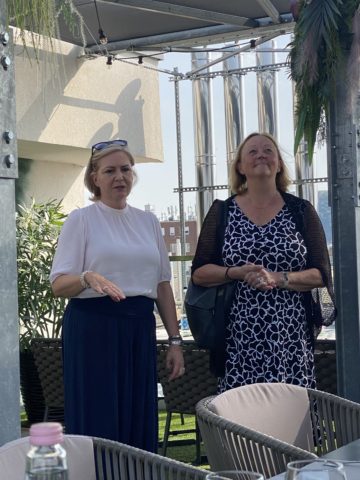
Project manager, Ágnes Puskás, and Norwegian ambassador in Hungary, Trina Skymoen, agree on the importance of the Wingate project.
If you have not already joined the Wingate platform, please do so.
We hope to see you there.
About the Wingate Project
The Wingate project is a collaboration between partners from Hungary, Romania, Serbia, Moldova and Norway. The goal is to create a green, competitive and inclusive entrepreneurial community in central and eastern Europe with guidance and networking for women who want to establish their own business or become investors. The project benefits from a €1,824,320 grant from Iceland, Liechtenstein and Norway through the EEA and Norway Grants Fund for Regional Cooperation. From Kvinner in Business, Toril Flåskjer, Marit Silseth and Lotte Frost are associated with the project.
Romanian businesses are operating on "very thin ice."
In 2023, 10 Wingate events brought together over 450 representatives of the local business ecosystem. The 10 cities where they took place provided an opportunity to disseminate the project's values, centered around the need for continuous education and a proactive approach to networking as a solution for sustainable scaling. It was also an occasion to deeply analyze the developments and challenges of the entrepreneurial development in 2023.
The outlook for 2023 was viewed with concern by more than half of the managers attending the Wingate events, given the inflation, decreased investment appetite, and financial blockages. Most believe that businesses are operating on "very thin ice."

The risk of insolvency is increasing as consumption, which is the main driver of the economy, continues to be affected by decreased purchasing power and limited access to credit, according to the study respondents.
Inflation has climbed to the second place among concerns for Romanian entrepreneurs. In addition to declining businesses and inflation, they are also worried about increasing financial blockages and rising financing costs, including expensive and limited access to credit.
"Inflation has had a significant impact on the economy, and its second-round effects will be visible until the end of 2023, when business dynamics could enter a negative trend, especially due to investors' confidence in the economy," said Cristina Chiriac, President of the National Association of Entrepreneurs, Founder of Flori de Ie.
"After two years of the pandemic and a year of strong inflation, 2023 is the year when we will face all the accumulated economic imbalances from this period. Business restructuring is a priority, and optimizing production and sales flows in line with demand evolution and new digital tools will be the general characteristic of an economy dealing with financial frost," added Cristina Chiriac.
Restructuring businesses are at the center of attention for 2023. Investors need to focus on reorganizing operations following the decline in consumption and the intensification of disintermediation, after a 2022 where the business environment was primarily focused on stimulating consumption following two years of the pandemic.
"A state of complete uncertainty" is the sad conclusion after managers hoped for a consumption recovery post-pandemic but were disappointed by the effects of inflation, which affected purchasing power and disrupted economic chains, especially due to increased production costs, particularly in the energy sector (electricity, gas, fuels), emphasized Nicoleta Munteanu, Vice President of the National Confederation for Women Entrepreneurship, Founder of Kids in Business, and a constant presence at Wingate events.
The results of the Wingate meetings show that, among the priorities for 2023, business restructuring is followed by securing business lines, mentioned by the majority of female entrepreneurs.
Only a quarter of the managers present at the meetings are relying on new investments in 2023, with most waiting to see the evolution of the local and international macroeconomic framework, given the ongoing conflict in Ukraine.
At the same time, the dynamics of businesses in 2023 will largely depend on the functioning of supplier credit, which represents the primary means of financing businesses in Romania, according to the study.
Investments and accelerated digitalization are key factors for 2023.
Most entrepreneurs believe that Romania's economic growth in 2022 was deceptive, driven mainly by inflation rather than the development of predictable and future-oriented businesses.
According to them, the effects of inflation could provide a positive outlook in the new year, although it is only loosely associated with real economic dynamics.
While last year predicted a strong economic recovery in the first half of 2023, the perception has now shifted towards the end of the second semester when a positive reorientation of the economy could be observed against the backdrop of decreasing inflation.
According to discussions within Wingate regarding the exit from the crisis, the stakes of the Romanian economy are primarily focused on curbing inflation and attracting funds from the National Recovery and Resilience Plan (PNRR) as solutions to keep the economy afloat.
Curbing inflation and emphasizing investments could save an economically uncertain year of 2023. For the financially fragile Romanian economy, the €29.18 billion allocated for PNRR implementation, including grants worth approximately €14.24 billion and loans worth €14.94 billion, could represent a lifeline to save businesses from an increasingly evident technical recession.
"A constant dialogue between the business environment and authorities is necessary. The existence of this dialogue helps the latter stay informed about the challenges faced by the business environment and provides some predictability to it. The stability of fiscal policies and the long-term predictability of the executive's vision on fiscal strategy give the business environment a competitive edge when local companies enter foreign markets," said Mihaela Mitroi, President of CONAF Bucharest and CEO of Global Tax Advice.
In 2023 the Wingate project events took place on February 2nd in Bucharest, February 3rd in Buzau, February 7th in Oradea, February 23rd in Sibiu, April 5th in Bucharest, May 3rd in Ploiesti, May 9th in Buzau, June 9th in Brasov, June 14th in Bucharest, and June 20th in Giurgiu, with over 450 participants representing the Romanian entrepreneurial environment.
Why sustainability is important for your business?
By Lotte Frost, Wingate Norway
Everybody is talking about sustainability and business as usual doesn’t exist anymore. We need to change how we run our companies in order to protect both the planet and the people, but also in order to generate future profit. There are many reasons why your company should focus on sustainability, but I would like to emphasise three – saving money, access to more projects and building strong relationships with your stakeholders.
You save money
The easiest thing we can start doing immediately is stop wasting. And it’s not just about resources, it also about time, people, processes and all activities your business is engaged in. In order to analyse what and how the company waste today, it’s important to analyse the whole value chain and your activities.
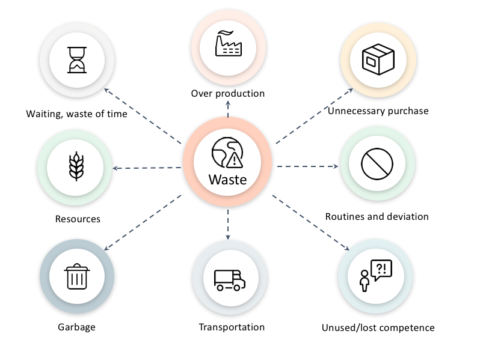
Source: Ecofric
The fact is that there is less access to all resources and they are more expensive. Both the corona pandemic and the war in Ukraine have contributed to escalating this development even faster. In addition to this we see that governments are starting to use fees and regulations on products and services that are not sustainable, so companies are forced to make more sustainable choices.
For some this can be an important competitive advantage and if you buy only what you need, use it up and recycle, it’s also a way of saving money. It’s all about moving from linear to circular economy and the fact that you reuse, repair, rental, recycle when it’s possible. It’s quality instead of quantity and it will save you time and money.
You get in position for more projects
The demands of running a sustainable company are increasing and reporting on sustainability will be mandatory in the future. Due to the EU-taxonomy the large companies are already being monitored, and the surveillance system will also affect smaller companies as suppliers and cooperating partners to the larger companies.
So, if your business can document that you focus on running a sustainable business, it will be easier for the larger companies to work with you. And if you are first or early mover in your market, it can be a real competitive advantage.
It’s important for your stakeholders
Your busi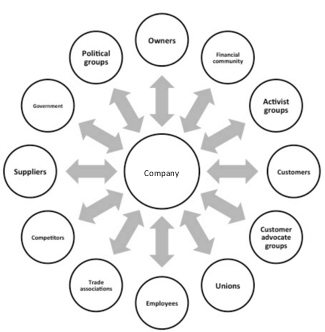 ness has an impact on many stakeholders, not just your costumers. There are a lot of groups affected by your business. It can be politicians, employees, owners, shareholders, the local community and so forth. They can be internal and external and you need to consider the number of people in the different stakeholder groups and the degree of importance.
ness has an impact on many stakeholders, not just your costumers. There are a lot of groups affected by your business. It can be politicians, employees, owners, shareholders, the local community and so forth. They can be internal and external and you need to consider the number of people in the different stakeholder groups and the degree of importance.
You need to understand all your stakeholders and you need to understand their problems, their issues and adjust your solution to fit their needs. When we meet their needs, we create a win win situation. The company become the problem solver, and will be considered a helping hand, a friend. In the end, our stakeholders can become attached to us and they will be future ambassadors. So, keeping the stakeholders happy is good for business. The importance of different stakeholders will vary from time to time, and it’s important that we recognize this and continuously evaluate and adjust our actions.
To sum it all up, sustainability is about balance. And in order to create a thriving and healthy business for the future you need to balance the three P’s – people, planet and profit. You need to commit and actively contribute to the essence of sustainability; meeting our own needs without compromising with the ability of future generations to meet their needs. It’s about causing little or no damage to the environment and creating a long-lasting business. And be transparent and communicate your results. It will save you money in the long run, you will be included in more projects and your stakeholders will applaud you. Good luck!
7-episode training programme by Woman/Business/Angels
Women/Business/Angels Association has organised a 7-episode training programme for 2022, to test its Wingate training materials and to involve more and more women into innovation financing. The programme started in March and ended in December, with several trainers and speakers involved. In the first semester, Imre Hild, MD of Global Traction and Training Lead of WBA shared his expertise and understanding related to the operation of Central and Eastern European innovation ecosystems, startups and business angel investments. Our special guests included Péter Csillag, President of HUNBAN, Matt Wohlmuth – Managing Director at Coding Sans, Tivadar Limbacher – Founder & CEO at Ma Este Színház Kft and Gábor Patkó – Co-Founder and CEO of SkillCert.io.
The second part of the training series presented several women’s experiences in business angel investment, mentoring, networking and portfolio building. We talked to LUMUS Investment members Zuzana Zamborska and Vladimíra Činčurová, Nóra Szeles, the woman behind the Tőkeportál crowdfunding platform and Viktória Sőregi, Project Coordinator of the Incorpora Program.
Participants had the opportunity to learn about the details and specifics, the unique solutions and individual cases of angel investments that are not in any textbook and had the chance to network among each other and also to get to know the speakers and trainers of the programme. While encouraging women to become business investors, the organisers also emphasized the importance of risk management, portfolio building and syndicated investments.
The training series serves as a the basis for training materials developed in the framework of the Wingate project. Wingate is funded by Iceland, Liechtenstein and Norway through the EEA and Norway Grants Fund for Regional Cooperation.
300 committed participants gathered at the Romania Venture Forum on 6 December 2022
Article by Lotte Frost
This is the very first venture forum in Romania and expectations were high. The participants were entrepreneurs, investors, various networks and several representatives from the government and central authorities. A total of 300 participants gathered in the beautiful Opera Nationala Bucharest. KiB and Wingate were represented by communication manager Lotte Frost.
The theme of the gathering was "Tech green companies", and therefore it was only natural that today's presenter opened the conference assisted by the robot Esko. The official opening was made by the State Secretary to Prime Minister Nicolae-Ionel CIUCĂ, who delivered the Prime Minister's greetings to the assembly. Two other key presenters were Ramona Chiriac, head of the EU representation in Bucharest and Sebastian Burduja, who is the Minister of Research, Innovation and Digitization in Romania.
Chiriac focused on the three C's - covid, conflict and climate change - as important factors for the future development of businesses, digitization and upscaling. She was clear that if we are to succeed with the digital and green transaction, SMEs must be part of this change.
Burduja wanted to thank everyone in the room for their participation and contribution to building new exciting businesses. He believed that start-ups and SMEs are like children, they need TLC (tender loving care), which he believes there has been too little of in Romania. But now there is an opening that must be seized, something the government is focusing on with better framework conditions and the establishment of a national fund to support businesses in an early growth phase. Burduja's message was very well received in the hall.
Throughout the day, there were five panel debates on various topics, with representatives from Wingate taking part in the last one. Here the Wingate project was presented and it was discussed how such projects can pave the way for improving the framework conditions for female entrepreneurs.
There were also two pitching rounds, where respectively five tech companies and five green companies presented their companies and ideas. A panel of investors evaluated the projects and asked questions. These were very interesting pitches, and a concept you could consider introducing in Kvinner in Business. In conclusion, two winners in each of the categories were named to great cheers from the hall.
The day was both exciting, engaging and interesting. Romania is developing rapidly, and we should all get engaged by the courage of entrepreneurs and developers in this region. The program ended with an informal gathering and, last but not least, an unforgettable dinner at a traditional Romanian restaurant that is over 100 years old.
Thanks to ANAA (The National Association of Entrepreneurs) in Romania for a very professional execution and thanks for the invitation.
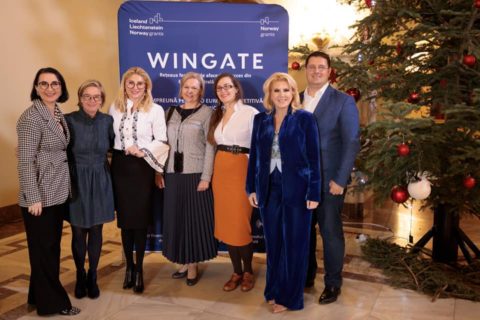
Bukarest 1: The representatives from Wingate were very satisfied with the event. From the left, Viorica Puscas, Lotte Frost, Nicoleta Munteanu, Agnes Puscas, Orsolya Szlahotka-Gödri, Cristina Chiriac and Aleksander Bijelic
Credited – ANAA
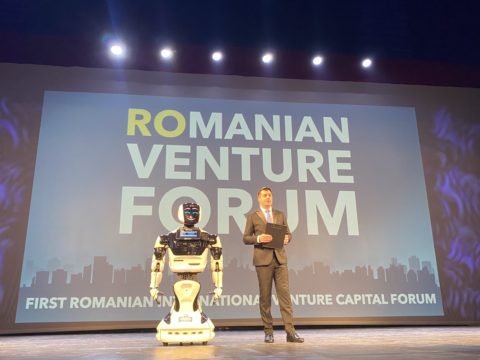
Bukarest 2: Journalist Adrian Cojocaru and the robot Esko guided us safely through the day.
Credited to Lotte Frost
About the Wingate Project
The Wingate project is a collaboration between partners from Hungary, Romania, Serbia, Moldova and Norway. The goal is to create a green, competitive and inclusive entrepreneurial community in central and eastern Europe with guidance and networking for women who want to establish their own business or become investors. The project is financially supported via an EEA grant of €1,824,320 from Iceland, Liechtenstein and Norway through the "EEA and Norway Grants Fund for Regional Cooperation". From Kvinner in Business, Toril Flåskjer, Marit Silseth and Lotte Frost are associated with the project. - For more information about the project, click here.
Belgrade Venture Forum 28-30 November 2022
Article by Marit Silseth
In connection with KiB's representation in the Wingate project, two representatives from the board Charlotte Borge-Andersen and chairman Toril Flåskjer and the project manager for Wingate Norway, Marit Silseth, attended the Belgrade Venture Forum in Belgrade, Serbia. In addition, KiB brought three guests, Cecilie Hoxmark from KiB and Rita Anson and Angela Holter from Women Investment Network (WIN), Norway.
The purpose of the participation was to build international networks, in addition to obtaining knowledge about what investors look for when they invest in companies. Exciting investment objects from participants all over the world were also presented. I have appointed professional and large investors who have shown interest in several of the presented projects.
During the conference, KiB was to take part in a panel debate on investments, and with a particular focus on the low proportion of investments allocated to companies run by women. In Norway, only 0.1% of all investments are allocated to female business owners. The representatives from WIN Network are both experts in this field, and Angela appeared on the panel at short notice. She made a very solid effort in the debate, thank you very much, Angela!
In addition to participation in the conference, the Wingate project had brought together all those involved for an update and planning meeting for the project. The project will soon enter its last six months and will end in June 2023 after a project period of three years.
As part of the visit, KiB also hosted a reception at the castle for Crown Prince Aleksandar and his wife Katarina, who are concerned with economic development in Serbia and receive the participants from this congress every year. Serbia is a republic, but Crown Prince Aleksandar was heir to the crown of Yugoslavia, and it was said that most citizens of Serbia want a monarchy. So that's why the republic has a crown prince-in-waiting.
This was a successful participation with Norwegian representatives who made a very good impression during the conference.
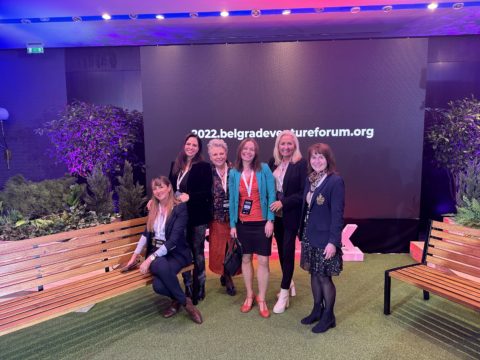
Belgrade 1: KiB's delegation in Belgrade. From left Rita Anson and Angela Holter from Win. Charlotte Borge-Andersen, Cecilie Hoxmark, Toril Flåskjer and Marit H. Silseth from KiB.
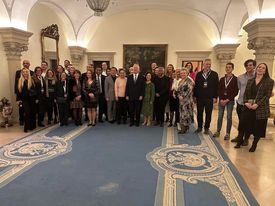
Belgrade 2: Great to have the opportunity to visit Serbia's crown prince couple at the castle.
